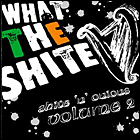Various Artists - Love, Loss & Liberty: The Songs of Alistair Hulett (Alistair Hulett Memorial Trust, 2011)
Released to coincide with the first anniversary of Alistair Hulett's sudden passing, this album is a celebration of Alistair's music, lyrics and political passion. It features a mix of previously released and specially recorded songs, ranging in date from 1989 to the present. Many of the artists involved are better-known than Alistair.
This well-paced compilation opens with James Fagan and Nancy Kerr, taking on 'Sons of Liberty'. It's a fresh take on the song that comes out sounding like it was written in the bushranging days that it describes. Next is the classic cover of Alistair's best-known song, 'He Fades Away' by June Tabor. There have been several versions of this song, but June Tabor's sparse and mournful version stands above them. It never fails to give me the chills. Rory McLeod applies his rhythmic, percussive guitar style (electric on this occasion) to 'Don't Sign Up for War'. Gone are the Glaswegian idioms, as Rory makes this a song that can be understood by all. David Rovics, meanwhile, contributes a scathing version of 'Behind Barbed Wire'. It's amazing to consider the power of folk music: here's an American singer telling the world about injustices taking place in a migrant detention centre in Sydney, Australia.
One of Alistair Hulett's particular strengths was his ability to write songs from a woman's point of view. 'No Half Measures' is the heartbreaking tale of a woman watching her husband drink himself to death, and the Niamh Parsons version here is a chilling reading of the song. Likewise, you could believe that Alistair wrote 'Mrs Barbour's Army' specifically with the voice of Sheena Wellington in mind. Sheena's raw a capella version is an authentic-sounding tribute to Mary Barbour and the Glasgow rent strikers of 1915.
The legendary Roy Bailey performs admirably on 'When the Small Birds Start Leaving', Alistair's empathetic look at modern-day gypsies in England. The treatment of 'The Dark Loch' by Alasdair Roberts with Donald Lindsay and Clutch Daisy is one of the highlights for me. The small pipes are a mournful and fitting accompaniment that bring tears to my eyes. The album is building momentum here, and the storming version of 'Among Proddy Dogs and Papes' by the Jason Wilson Band is followed up by a fiery yet laidback rendition of 'Militant Red' by Sigarro of Banda Bassotti and Pierluigi 'Piggio' Placido. This one, sung in a heavy Italian accent, shows just how far and wide Alistair's music has reached.
Just when you're thinking how much you miss Alistair's wonderful voice, there it is: the rocking version of 'The Day The Boys Came Down' that Alistair recorded with Sydney City Trash in 2005. A great singalong that segues nicely into the newly recorded Handsome Young Strangers' take on 'The Swaggies Have All Waltzed Matilda Away'. It's a magical version that is up there with the best work of the Bushwackers.
The album reaches its climax with the most famous Roaring Jack cover of all. Canada's Irish Rovers brought Alistair's music to a wider audience in 1989, with its surprisingly rocked-out version of 'Buy Us A Drink'. This version led to a landslide of Canadian covers of this song, which has become something of a standard over there.
Alistair often finished his shows with his rousing version of 'The Internationale', and what better way to complete this album? Alistair's version has no equal, so the compilers chose to use that. Like vintage port after a good meal, this is a fitting finale to a wonderful celebration of Alistair Hulett. The number of classic Alistair Hulett songs and the esteem in which Alistair Hulett is held in the folk community mean that this will not be the only Hulett tribute album. Here's to many more.
Love, Loss and Liberty: The Songs of Alistair Hulett can be purchased from the Alistair Hulett website. All proceeds will be directed to the Alistair Hulett Memorial Fund.
Labels: Alistair Hulett






















